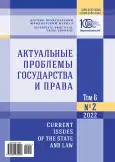Evolution of juvenile justice in the Russian legislation of the 20th century
- Authors: MIRZOYAN M.A.1
-
Affiliations:
- North Caucasian branch of The Russian State University of Justice
- Issue: Vol 6, No 2 (2022)
- Pages: 158-166
- Section: General Theory and History of Law and the State
- URL: https://journal-vniispk.ru/2587-9340/article/view/303758
- ID: 303758
Cite item
Abstract
The development of legislation in the field of protection of children's rights is one of the priorities of the policy of the Russian Federation. Based on this, the issue of the creation and functioning of the system of juvenile courts in Russia is often discussed, but scientists and researchers have not come to a consensus on this issue. At the same time, the peculiarities of juvenile justice in the period of the Soviet Union are of interest, since many researchers believe that during the indicated period juvenile justice did not exist in our country. The purpose of this scientific article is to study the history of juvenile justice and all its manifestations during the existence of the Soviet Union, as well as to identify its characteristic features throughout the designated period. Dialectical and historical methods were used as the main research methods, which made it possible to follow this legal institution in its dynamics. In addition, analysis and synthesis were used as methods, as well as a comparative approach, which made it possible to identify the features of juvenile justice at different stages of the twentieth century. Based on the results of consideration of the chosen topic, it was found out that the beginnings of juvenile justice were laid at the beginning of the twentieth century before the October Revolution of 1917, which was expressed in the actual existence of juvenile courts. It was revealed that the period from the 1930s to the 1950s was characterized by an increased level of responsibility for crimes committed by minors. During this period, the status of minors as subjects of a crime practically did not differ from the status of adults. It is concluded that since the 1950s, responsibility for crimes committed by teenagers has been mitigated, guarantees appear in the Criminal Code that ensure the protection of the rights and freedoms of minors.
About the authors
Mariya A. MIRZOYAN
North Caucasian branch of The Russian State University of Justice
Author for correspondence.
Email: mirzoyanmariya@yandex.ru
ORCID iD: 0000-0002-7676-4715
Lecturer of Criminal Law Department
Russian Federation, 234 Krasnykh Partizan St., Krasnodar 350020, Russian FederationReferences
- Matveyev S.V. Genezis idei o differentsiatsii podkhoda k nesovershennoletnim ot Ustava ugolovnogo sudo-proizvodstva do UPK Rossiyskoy Federatsii [Genesis of the idea of a differential approach to minors from the Criminal Procedure Charter to the CPC of the Russian Federation]. Aktual’nyye problemy rossiyskogo prava – Actual Problems of Russian Law, 2014, no. 4, pp. 582-589. (In Russian).
- Zamyshlyayev D.M. Perspektivy yuvenal’noy yustitsii v Rossii: istoricheskiye aspekty [Prospects of juvenile justice in Russia: historical aspects]. Voprosy yuvenal’noy yustitsii [Issues of Juvenile Justice], 2012, no. 5, pp. 18-22. (In Russian).
- Goldstein N., Olubadewo O., Redding R.E., Lexcen F. Mental Health Disorders: The Neglected Risk Factor in Juvenile Delinquency. Juvenile Delinquency: Prevention, Assessment, and Intervention, 2005, pp. 85-110.
- Dubonosova A.E. Rol’ gosudarstva v profilaktike prestupleniy nesovershennoletnikh: istoricheskiy aspekt [The role of the state in preventing juvenile delinquency: a historical aspect]. Advokatskaya praktika – Advocacy Practice, 2005, no. 6, pp. 6-8. (In Russian).
- Malchuk O.I., Rumyantsev N.V. Istoriya yuvenal’noy yustitsii [History of juvenile justice]. Ugolovno-ispolnitel’noye pravo – Criminal Executive Law, 2018, vol. 13, no. 1, pp. 19-24. (In Russian).
- Markovicheva E.V. Nesovershennoletniy v sisteme ugolovnogo sudoproizvodstva v Rossii pervoy poloviny XX v. [Minor in the system of criminal proceedings in Russia in the first half of 20th century]. Istoriya gosudarstva i prava [History of the State and Law], 2009, no. 6, pp. 33-36. (In Russian).
- Kodintsev A.Y. Yuvenal’naya yustitsiya v SSSR pri Staline [Juvenile Justice in the USSR under Stalin]. Voprosy yuvenal’noy yustitsii [Issues of Juvenile Justice], 2012, no. 5, pp. 3-7. (In Russian).
- Slobogin C., Fondacaro M. R., Cross T. Reconceptualizing Due Process in Juvenile Justice: Contributions from Law and Social Science. Hasting Law Journal, 2006, vol. 57, pp. 955-990.
Supplementary files








